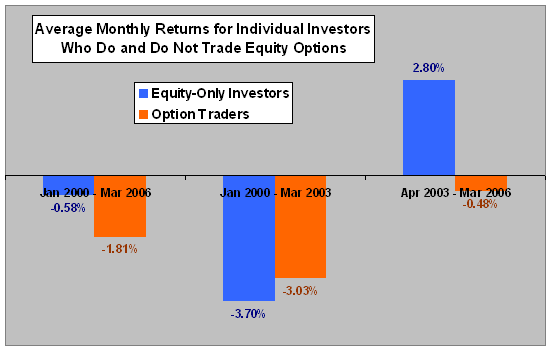Do individual investors who trade equity options do better or worse than those who do not? In their October 2008 paper entitled “Option Trading and Individual Investor Performance”, Rob Bauer, Mathijs Cosemans and Piet Eichholtz examine the impact of option trading on individual investor performance. Using all daily trades and end-of-month portfolio positions for 68,146 individual Dutch investors (41,880 who trade equities only and 26,266 who trade options at least once) over the period January 2000 to March 2006, they conclude that:
- Individual investors who trade equity options underperform those who do not by a risk-adjusted average of 1% (2.75%) per month based on gross (net) returns. Net portfolio returns are close to zero for the top third of individuals who trade options, but very negative for the bottom fifth. The worst performers tend to be male investors with little experience and low income who hold small accounts with high turnover.
- Bad market timing derived from overreaction to past stock market returns (individual option traders seem especially prone to overreact) and high trading costs are probable drivers of this poor performance. Option trader underperformance is concentrated in the (bullish) April 2003-March 2006 subperiod, suggesting inordinate reluctance to acknowledge a change in market trend in 2003.
- Gambling and entertainment appear to be the most important motivations for individual investors to trade options, with hedging only a minor consideration. Relatively few perform any formal risk-return analysis on the positions they take.
- There is strong evidence of performance persistence among individual option traders. The top 10% of these traders for a given year on average continue to outperform the bottom 10% by about 5% per month net in the following year.
The following table, constructed from data in the paper, summarizes average raw monthly returns for individual investors who do and do not trade equity options over the entire sample period and during two subperiods. Overall, option traders underperform equity-only traders, with underperformance concentrated during the the second (bullish) subperiod.

In summary, evidence suggests that individual investors who trade options in aggregate underperform their counterparts who do not because: (1) they are especially prone to overreact to past market returns; and, (2) they bear high trading costs.